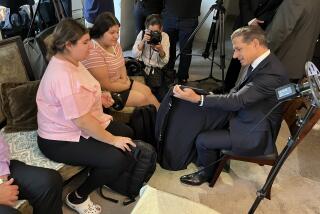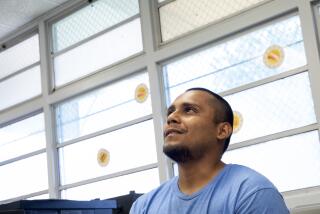School-based health clinics play vital role in childrens’ lives
- Share via
Treating skinned knees and stomachaches is part of the drill at any school nurse’s office or school-based health center. But healthcare providers at these sites do much more than treat everyday aches and pains: They give checkups and vaccinations, make sure kids take their insulin shots and antidepressants on time, and teach them how to manage chronic conditions such as asthma.
School-based health centers go beyond the services of a school nurse. They are clinics that provide primary care to students, and often mental health and dental care as well. Sometimes these facilities also provide reproductive health services, such as birth control, to middle and high school students.
Typically located in medically under-served urban areas, school-based health centers are relatively rare: Only about 1,900 of the roughly 133,000 schools across the country have them. Funding is often cobbled together from a variety of sources, including community-based health centers, healthcare systems, foundation grants, and state and local funds.
Generally, school-based health centers supplement the care that children receive from their regular pediatrician — if they have one.
To make their job easier, the 2010 healthcare law included additional funds for school-based health centers. The first grants — totaling $95 million for 278 centers — were announced this summer, with $105 million more scheduled to follow. The money will help bolster the role that school-based healthcare providers play in children’s lives, experts say.
“You get to see things that you just can’t see in a private doctor’s office when a parent brings them in,” says pediatrician Veda Johnson, a longtime advocate for school-based health centers and director of the Urban Health Program at Atlanta’s Emory University.
Over the years, some pediatricians have expressed concern that the clinics could disrupt their relationships with families and lead to fragmented care, says Dr. Robert Murray, who recently served as chairman of the Council on School Health for the American Academy of Pediatrics. But many kids who go through school-based health centers “are not otherwise connected to a healthcare provider,” he says.
For some kids, in fact, their school clinic doctor or nurse practitioner is their primary healthcare provider, caring for them even after they move on to another school.
That’s the way it is at the four elementary school clinics operated by HEALS (Health Establishments at Local Schools) in Huntsville, Ala. Starting with a well-child visit at the beginning of the school year, clinic staff members keep regular tabs on the kids, providing vaccinations and treatment for such issues as allergies and strep throat. Even after they leave elementary school, the kids come back for care, usually until they reach age 19.
“We are the medical home for our children,” says Connie Carnes, executive director for HEALS, which received $313,107 in grants that it will use to build two new health centers and an electronic medical records system and for other projects.
For working parents, especially the working poor, having children’s medical needs taken care of at school makes sense and is more cost-effective for the healthcare system overall, Carnes says.
“If you have a job as a maid, it’s hard to get time off for a doctor’s appointment,” she says. “Sniffles shouldn’t have to be treated in the emergency department.”
The next round of funds is expected to be distributed next summer, says Linda Juszczak, executive director of the National Assembly on School-Based Health Care, a Washington-based advocacy group. However, given ongoing political and budgetary challenges, the remaining funds could be at risk, she says. “We’ll do everything in our power to ensure that it remains safe.”
Andrews writes for Kaiser Health News, an editorially independent news service and a program of the Kaiser Family Foundation, a nonpartisan healthcare policy research organization. Neither Kaiser Health News nor the foundation is affiliated with Kaiser Permanente.
More to Read
Sign up for Essential California
The most important California stories and recommendations in your inbox every morning.
You may occasionally receive promotional content from the Los Angeles Times.












